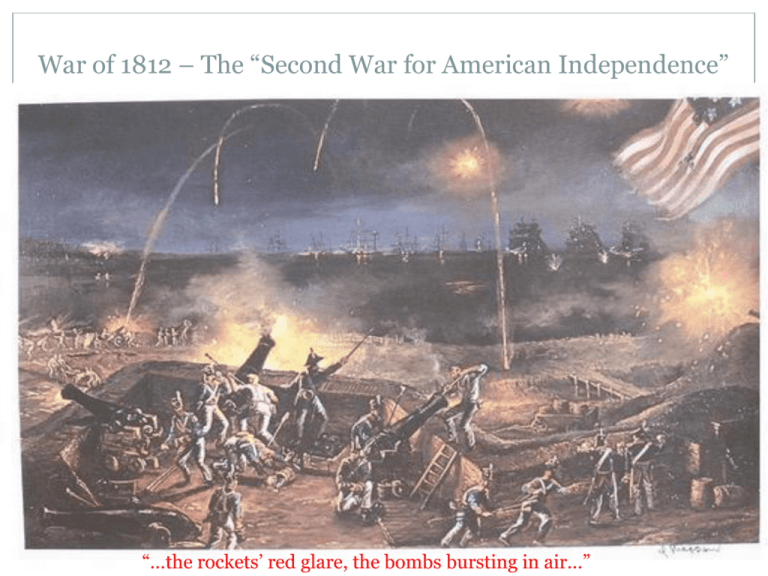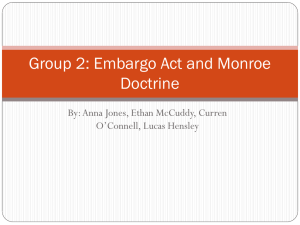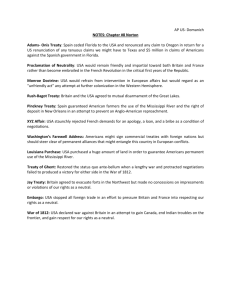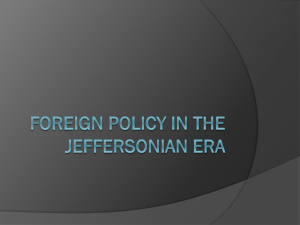orders in council
advertisement

War of 1812 – The “Second War for American Independence” “…the rockets’ red glare, the bombs bursting in air…” Causes of the War of 1812 Rooted in European wars stemming from the French Revolution U.S., still a very young nation, attempted to remain neutral. Remember Washington’s Neutrality Proclamation of 1793? For nearly 20 years (beginning in 1792), Britain nevertheless violated U.S. neutrality Jay Treaty As war between France and Britain raged, tensions flared along the Canadian border and on the seas. To avoid war, Washington sent Chief Justice John Jay to England to negotiate for peace. The treaty was signed in 1794, resolving many issues left over from the 1783 Treaty of Paris, such as border and trade disputes. This treaty helped maintain peace between the U.S. and Britain, for a time... Renewed tensions with Britain In 1805, the British inflicted a crushing defeat on the French Navy at the Battle of Trafalgar, thereby ensuring Britain’s supremacy on the seas. England expects that every man will do his duty! Renewed tensions with Britain That same year, Napoleon crushed the combined Austrian and Russian armies at the battle of Austerlitz, thereby ensuring French supremacy on the European continent. Trade Disputes Unable to hurt each other directly, Britain and France turned to economic warfare. Beginning in 1806, the British issued a series of ORDERS IN COUNCIL These edicts established a naval blockade around Europe aimed at closing French ports to foreign trade, including American shipping Having declared neutrality, the United States viewed this as a violation of U.S. sovereignty Trade Disputes France responded to the British Orders in Council by ordered the seizure of all merchant ships that entered British ports. The U.S. was thus caught in the middle of the Anglo-French conflict. To trade with one would mean conflict with the other. Embargo Act of 1807 Jefferson tried to get both England and France to back off with the Embargo Act of 1807, which stopped exports of all goods from the United States This backfired, hurting the American economy more than Britain and France. Three days before Jefferson left office, the Embargo was repealed on March 1, 1809 Replaced by a watered down Version called the Non-Intercourse Act (aimed solely at Britain and France Macon’s Bill No. 2 Under Madison, the U.S. government tried to break the British and French trade barriers with Macon’s Bill No. 2 Under Macon’s Bill, the U.S. would reopen trade with the world, but… …If Britain or France repealed their commercial restrictions, the United States would restore its embargo against the nonrepealing nation. This gamble failed, largely because Britain’s position was: the United States can trade exclusively with Britain, or with nobody at all British Impressment As war with France raged, the British controlled the seas while the French controlled the European continent. The British practiced impressment – the forcible enlistment of sailors. Between 1808 and 1811, around 6,000 American citizens were impressed into the British Navy Chesapeake-Leopard Affair In 1807, the HMS Leopard pursued, attacked and boarded a U.S. frigate off the coast of Virginia, demanding the surrender of alleged British deserters. Three Americans were killed and 18 were wounded. Four crew members were removed from the American vessel and were tried for desertion, one of whom was subsequently hanged. Prime example of British violations of U.S. sovereignty on the seas, which became commonplace during this time Native American aggression backed by Britain The British continued to back Native American aggression against the U.S. A prominent example is Tecumseh and the Prophet, who formed an alliance of tribes east of the Mississippi. The Prophet was defeated by future president William Henry Harrison at the Battle of Tippecanoe, but Tecumseh continued to fight for the British until his death in 1813. Second War with England A growing segment of the American population, known as “war hawks,” wanted war with England (due to impressment, continued trade disruption, and Native American hostilities) Madison decided war with England was inevitable. He asked Congress to declare war on June 1, 1812 Bring it, England. ‘Murica is ready for round two! New England WAR HAWKS The West The South The 3 key voting sections before The War of 1812






